Legal and Professional Issues in Nursing: A Comprehensive Report
VerifiedAdded on 2023/01/19
|5
|825
|65
Report
AI Summary
This report delves into the legal and professional issues encountered in nursing, with a particular emphasis on hand hygiene practices. It begins with a concept map illustrating key aspects such as the WHO's 5 moments of hand hygiene, respiratory etiquette, and the NMBA code of conduct. The report highlights the significance of hand hygiene in preventing the spread of infections, including antibiotic-resistant pathogens, and addresses the healthcare environment's impact on these practices. It examines routine barriers to hand hygiene, healthcare worker risks, and the importance of knowledge, awareness, and education. The report also discusses healthcare associated infection intervention strategies, the use of protective barriers, and the availability of hand hygiene supplies. References to relevant research are included, providing a comprehensive overview of the subject matter.
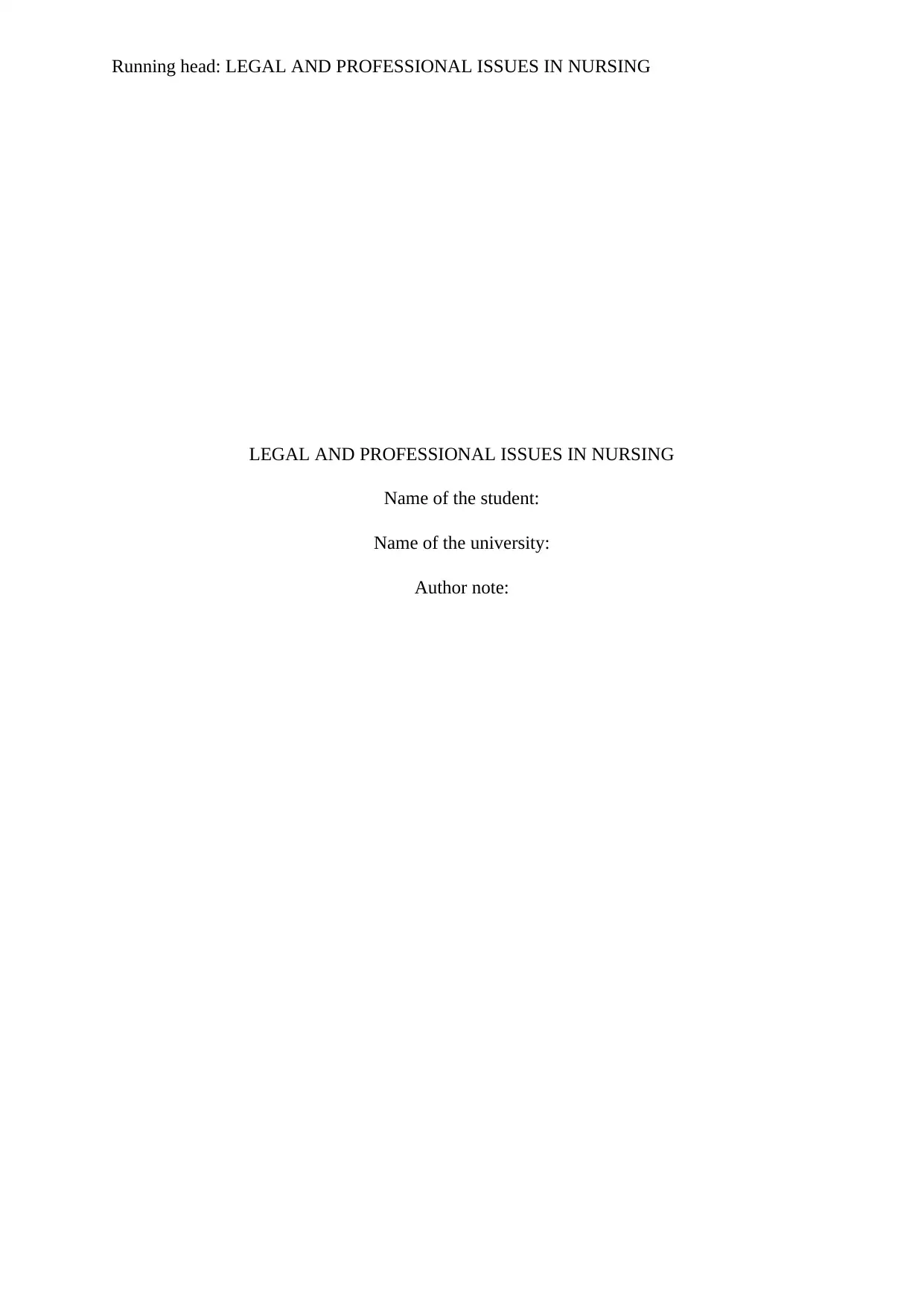
Running head: LEGAL AND PROFESSIONAL ISSUES IN NURSING
LEGAL AND PROFESSIONAL ISSUES IN NURSING
Name of the student:
Name of the university:
Author note:
LEGAL AND PROFESSIONAL ISSUES IN NURSING
Name of the student:
Name of the university:
Author note:
Paraphrase This Document
Need a fresh take? Get an instant paraphrase of this document with our AI Paraphraser
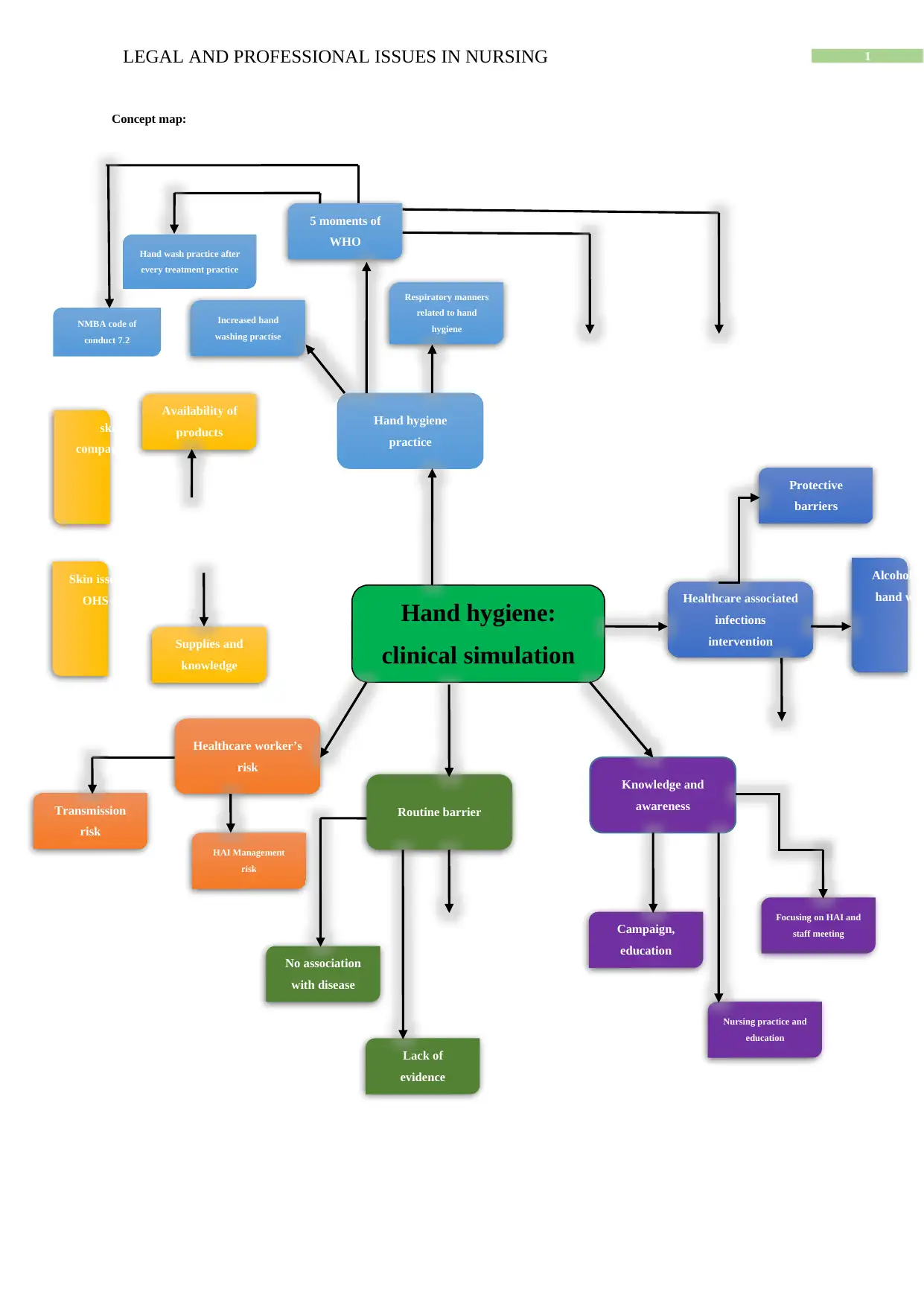
1LEGAL AND PROFESSIONAL ISSUES IN NURSING
Concept map:
Hand hygiene:
clinical simulation
Healthcare worker’s
risk
Hand hygiene
practice
Knowledge and
awareness
Routine barrier
Healthcare associated
infections
intervention
Lack of
evidence
No association
with disease
Campaign,
education
Nursing practice and
education
Focusing on HAI and
staff meeting
Alcohol ba
hand was
Protective
barriers
Skin issues and
OHS need
skin
compatibility
Supplies and
knowledge
HAI Management
risk
Transmission
risk
Increased hand
washing practise
5 moments of
WHO
Respiratory manners
related to hand
hygiene
Availability of
products
NMBA code of
conduct 7.2
Hand wash practice after
every treatment practice
Concept map:
Hand hygiene:
clinical simulation
Healthcare worker’s
risk
Hand hygiene
practice
Knowledge and
awareness
Routine barrier
Healthcare associated
infections
intervention
Lack of
evidence
No association
with disease
Campaign,
education
Nursing practice and
education
Focusing on HAI and
staff meeting
Alcohol ba
hand was
Protective
barriers
Skin issues and
OHS need
skin
compatibility
Supplies and
knowledge
HAI Management
risk
Transmission
risk
Increased hand
washing practise
5 moments of
WHO
Respiratory manners
related to hand
hygiene
Availability of
products
NMBA code of
conduct 7.2
Hand wash practice after
every treatment practice
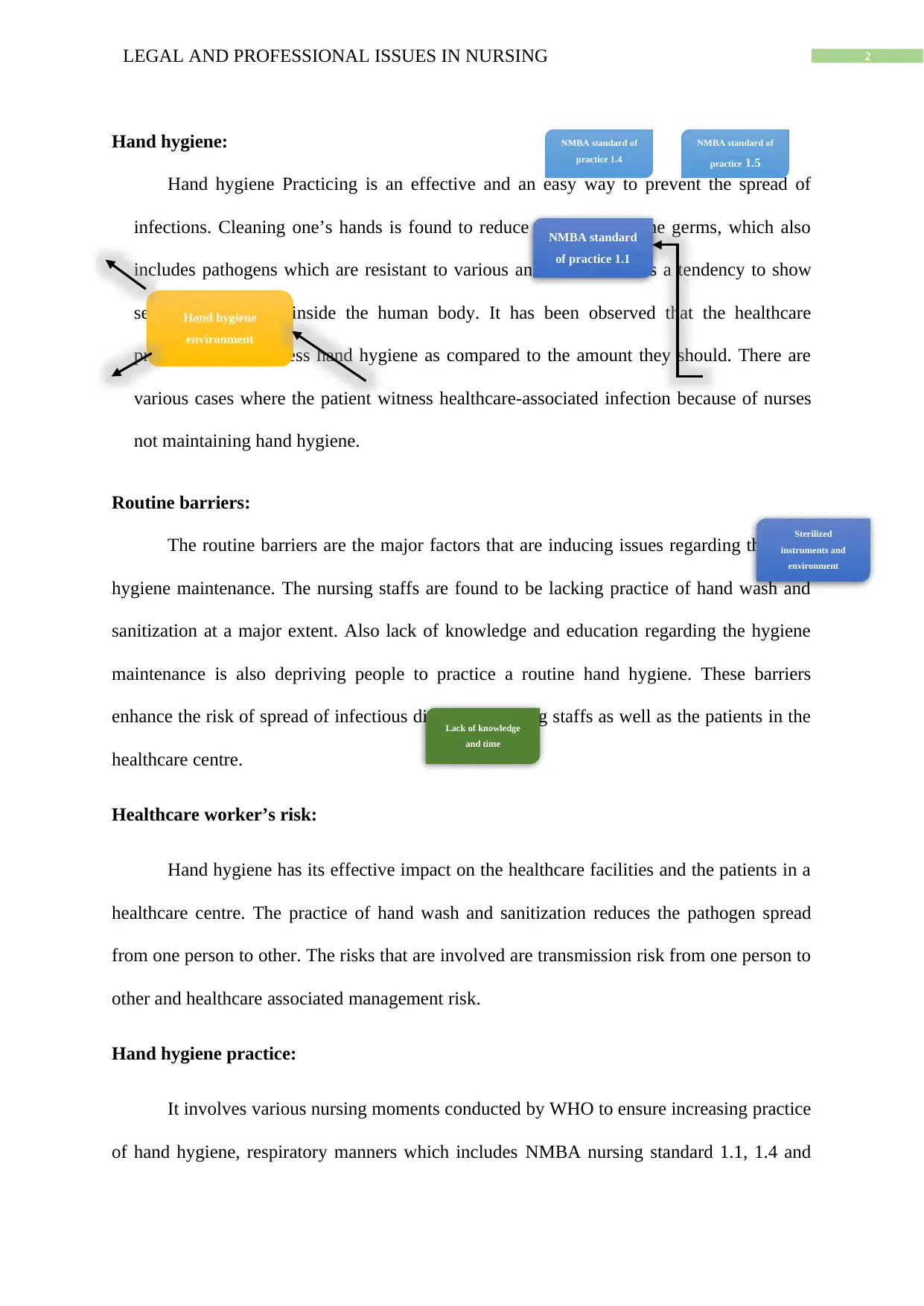
2LEGAL AND PROFESSIONAL ISSUES IN NURSING
Hand hygiene:
Hand hygiene Practicing is an effective and an easy way to prevent the spread of
infections. Cleaning one’s hands is found to reduce the spread of the germs, which also
includes pathogens which are resistant to various antibiotics and has a tendency to show
severity, if entered inside the human body. It has been observed that the healthcare
providers maintain less hand hygiene as compared to the amount they should. There are
various cases where the patient witness healthcare-associated infection because of nurses
not maintaining hand hygiene.
Routine barriers:
The routine barriers are the major factors that are inducing issues regarding the hand
hygiene maintenance. The nursing staffs are found to be lacking practice of hand wash and
sanitization at a major extent. Also lack of knowledge and education regarding the hygiene
maintenance is also depriving people to practice a routine hand hygiene. These barriers
enhance the risk of spread of infectious disease in nursing staffs as well as the patients in the
healthcare centre.
Healthcare worker’s risk:
Hand hygiene has its effective impact on the healthcare facilities and the patients in a
healthcare centre. The practice of hand wash and sanitization reduces the pathogen spread
from one person to other. The risks that are involved are transmission risk from one person to
other and healthcare associated management risk.
Hand hygiene practice:
It involves various nursing moments conducted by WHO to ensure increasing practice
of hand hygiene, respiratory manners which includes NMBA nursing standard 1.1, 1.4 and
Hand hygiene
environment
Lack of knowledge
and time
Sterilized
instruments and
environment
NMBA standard of
practice 1.4
NMBA standard of
practice 1.5
NMBA standard
of practice 1.1
Hand hygiene:
Hand hygiene Practicing is an effective and an easy way to prevent the spread of
infections. Cleaning one’s hands is found to reduce the spread of the germs, which also
includes pathogens which are resistant to various antibiotics and has a tendency to show
severity, if entered inside the human body. It has been observed that the healthcare
providers maintain less hand hygiene as compared to the amount they should. There are
various cases where the patient witness healthcare-associated infection because of nurses
not maintaining hand hygiene.
Routine barriers:
The routine barriers are the major factors that are inducing issues regarding the hand
hygiene maintenance. The nursing staffs are found to be lacking practice of hand wash and
sanitization at a major extent. Also lack of knowledge and education regarding the hygiene
maintenance is also depriving people to practice a routine hand hygiene. These barriers
enhance the risk of spread of infectious disease in nursing staffs as well as the patients in the
healthcare centre.
Healthcare worker’s risk:
Hand hygiene has its effective impact on the healthcare facilities and the patients in a
healthcare centre. The practice of hand wash and sanitization reduces the pathogen spread
from one person to other. The risks that are involved are transmission risk from one person to
other and healthcare associated management risk.
Hand hygiene practice:
It involves various nursing moments conducted by WHO to ensure increasing practice
of hand hygiene, respiratory manners which includes NMBA nursing standard 1.1, 1.4 and
Hand hygiene
environment
Lack of knowledge
and time
Sterilized
instruments and
environment
NMBA standard of
practice 1.4
NMBA standard of
practice 1.5
NMBA standard
of practice 1.1
⊘ This is a preview!⊘
Do you want full access?
Subscribe today to unlock all pages.

Trusted by 1+ million students worldwide
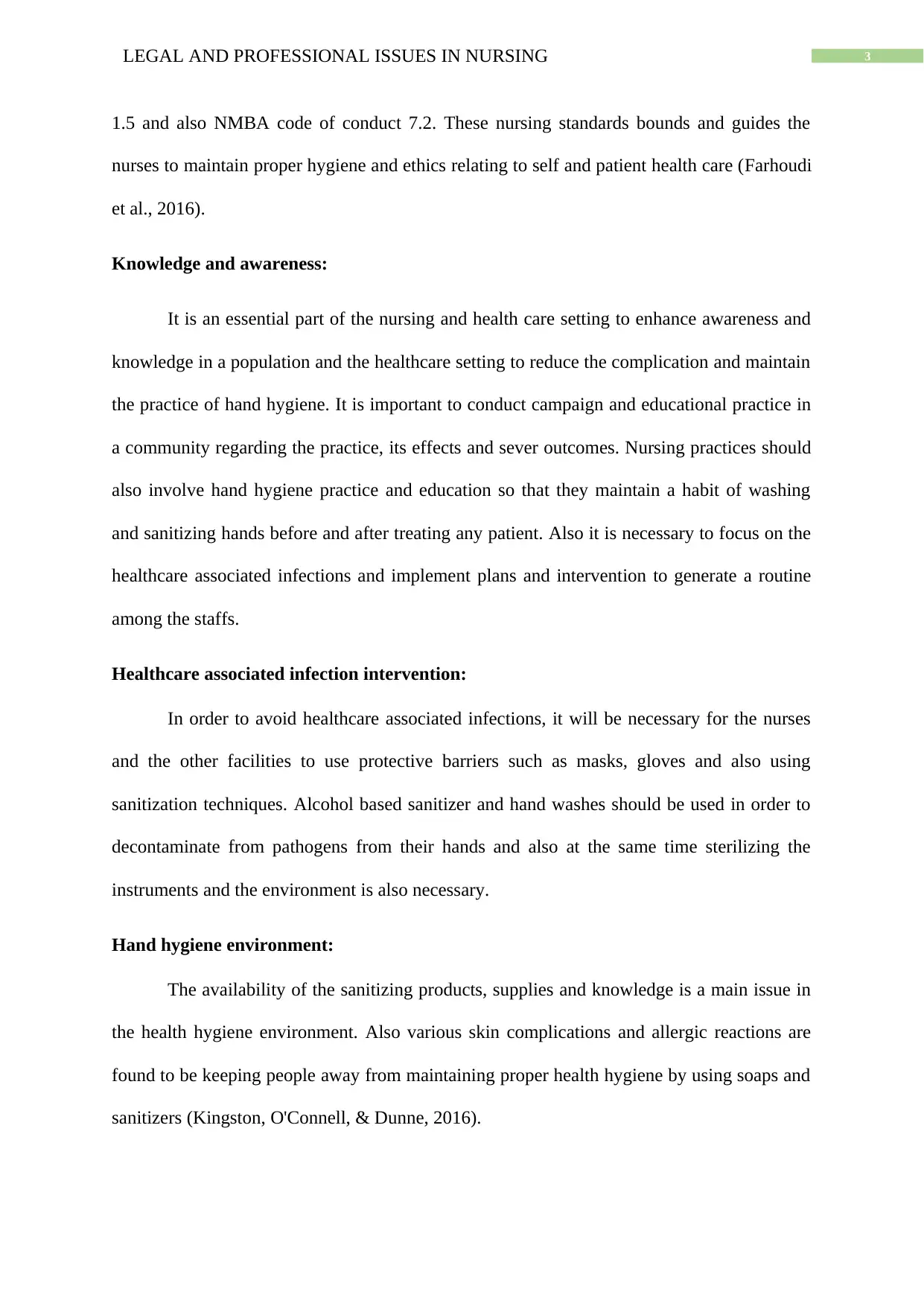
3LEGAL AND PROFESSIONAL ISSUES IN NURSING
1.5 and also NMBA code of conduct 7.2. These nursing standards bounds and guides the
nurses to maintain proper hygiene and ethics relating to self and patient health care (Farhoudi
et al., 2016).
Knowledge and awareness:
It is an essential part of the nursing and health care setting to enhance awareness and
knowledge in a population and the healthcare setting to reduce the complication and maintain
the practice of hand hygiene. It is important to conduct campaign and educational practice in
a community regarding the practice, its effects and sever outcomes. Nursing practices should
also involve hand hygiene practice and education so that they maintain a habit of washing
and sanitizing hands before and after treating any patient. Also it is necessary to focus on the
healthcare associated infections and implement plans and intervention to generate a routine
among the staffs.
Healthcare associated infection intervention:
In order to avoid healthcare associated infections, it will be necessary for the nurses
and the other facilities to use protective barriers such as masks, gloves and also using
sanitization techniques. Alcohol based sanitizer and hand washes should be used in order to
decontaminate from pathogens from their hands and also at the same time sterilizing the
instruments and the environment is also necessary.
Hand hygiene environment:
The availability of the sanitizing products, supplies and knowledge is a main issue in
the health hygiene environment. Also various skin complications and allergic reactions are
found to be keeping people away from maintaining proper health hygiene by using soaps and
sanitizers (Kingston, O'Connell, & Dunne, 2016).
1.5 and also NMBA code of conduct 7.2. These nursing standards bounds and guides the
nurses to maintain proper hygiene and ethics relating to self and patient health care (Farhoudi
et al., 2016).
Knowledge and awareness:
It is an essential part of the nursing and health care setting to enhance awareness and
knowledge in a population and the healthcare setting to reduce the complication and maintain
the practice of hand hygiene. It is important to conduct campaign and educational practice in
a community regarding the practice, its effects and sever outcomes. Nursing practices should
also involve hand hygiene practice and education so that they maintain a habit of washing
and sanitizing hands before and after treating any patient. Also it is necessary to focus on the
healthcare associated infections and implement plans and intervention to generate a routine
among the staffs.
Healthcare associated infection intervention:
In order to avoid healthcare associated infections, it will be necessary for the nurses
and the other facilities to use protective barriers such as masks, gloves and also using
sanitization techniques. Alcohol based sanitizer and hand washes should be used in order to
decontaminate from pathogens from their hands and also at the same time sterilizing the
instruments and the environment is also necessary.
Hand hygiene environment:
The availability of the sanitizing products, supplies and knowledge is a main issue in
the health hygiene environment. Also various skin complications and allergic reactions are
found to be keeping people away from maintaining proper health hygiene by using soaps and
sanitizers (Kingston, O'Connell, & Dunne, 2016).
Paraphrase This Document
Need a fresh take? Get an instant paraphrase of this document with our AI Paraphraser
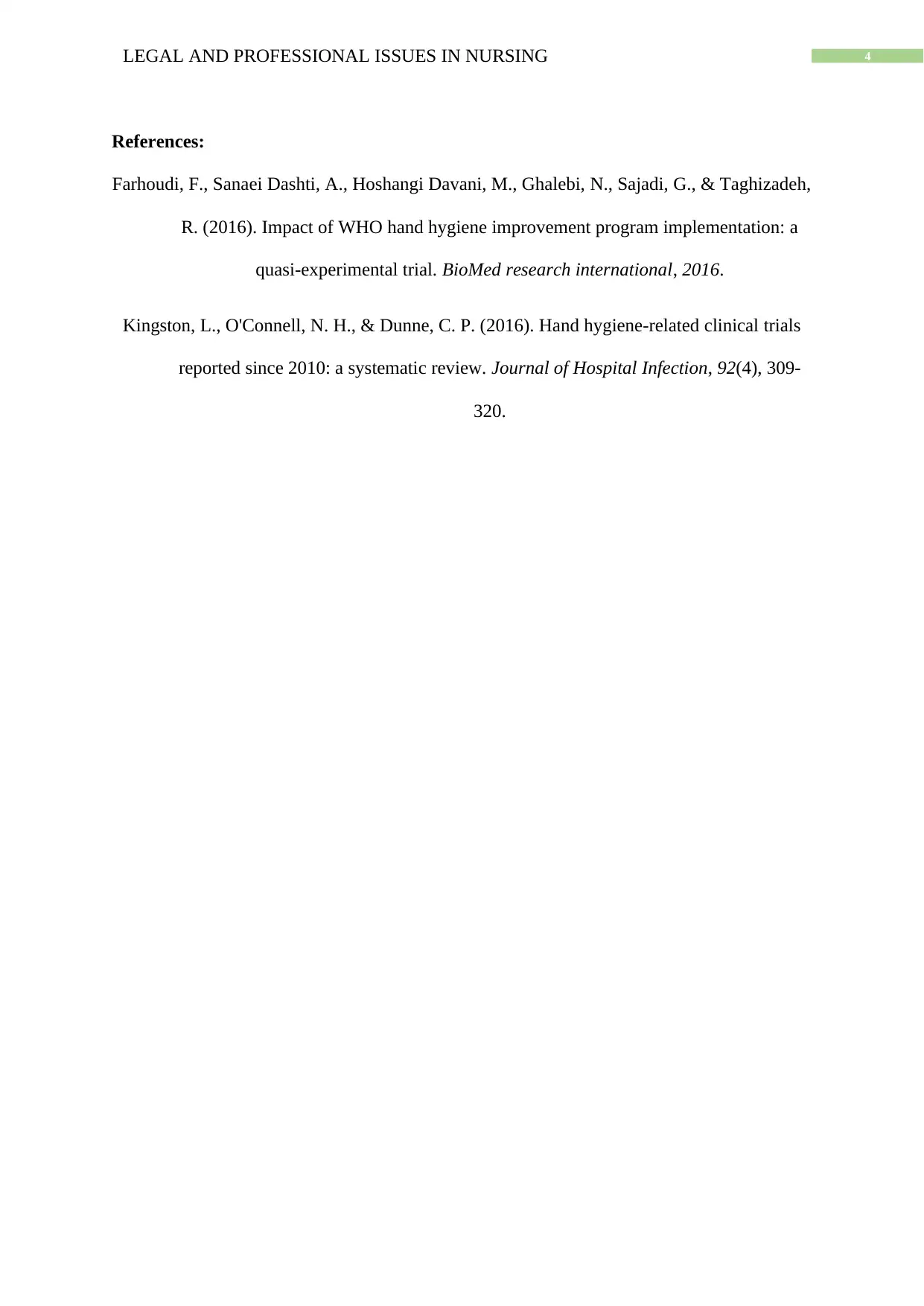
4LEGAL AND PROFESSIONAL ISSUES IN NURSING
References:
Farhoudi, F., Sanaei Dashti, A., Hoshangi Davani, M., Ghalebi, N., Sajadi, G., & Taghizadeh,
R. (2016). Impact of WHO hand hygiene improvement program implementation: a
quasi-experimental trial. BioMed research international, 2016.
Kingston, L., O'Connell, N. H., & Dunne, C. P. (2016). Hand hygiene-related clinical trials
reported since 2010: a systematic review. Journal of Hospital Infection, 92(4), 309-
320.
References:
Farhoudi, F., Sanaei Dashti, A., Hoshangi Davani, M., Ghalebi, N., Sajadi, G., & Taghizadeh,
R. (2016). Impact of WHO hand hygiene improvement program implementation: a
quasi-experimental trial. BioMed research international, 2016.
Kingston, L., O'Connell, N. H., & Dunne, C. P. (2016). Hand hygiene-related clinical trials
reported since 2010: a systematic review. Journal of Hospital Infection, 92(4), 309-
320.
1 out of 5
Related Documents
Your All-in-One AI-Powered Toolkit for Academic Success.
+13062052269
info@desklib.com
Available 24*7 on WhatsApp / Email
![[object Object]](/_next/static/media/star-bottom.7253800d.svg)
Unlock your academic potential
Copyright © 2020–2026 A2Z Services. All Rights Reserved. Developed and managed by ZUCOL.





